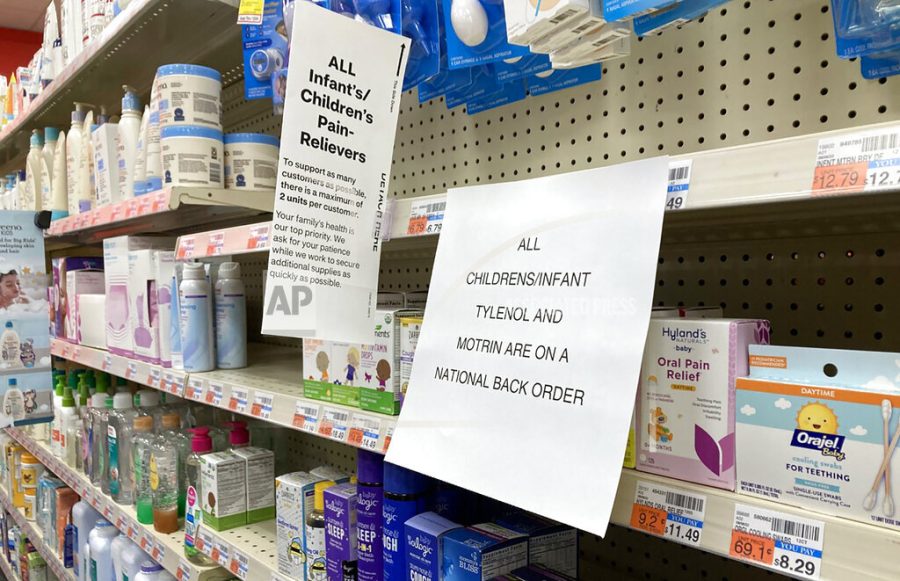Cold and flu medication in short supply
A sign is placed near the section for children’s medicine, Sunday, Dec. 18, 2022 at a CVS in Greenlawn, N.Y. Caring for a sick child has become even more stressful than usual for many U.S. parents in recent weeks due to shortages of Children’s Tylenol and other medicines. (AP Photo/Leon Keith)
February 3, 2023
It’s that time of year again, when lecture halls are filled with frequent sniffles, prompting many to wonder if it’s just the dry weather or if a new virus has started to go around — and if students do get sick, they may struggle to find treatment this time around.
Dr. Anita McElroy, a pediatrics researcher and clinician at UPMC, said she witnessed this depletion herself at the CVS on Forbes Avenue.
“I just looked at the shelves, and there are definitely some medications that there’s nothing there, that they’re sold out of,” McElroy said.
Retailers across the US are experiencing similar cold and flu medication shortages. According to the Wall Street Journal, sales of cough and cold medications rose by 35% in December 2022 compared to last year, and supply has not kept up. Pitt’s campus is no exception to this shortage.
McElroy said the shortage is a side effect of the COVID-19 pandemic. She explained that as Pitt’s campus returned “back to normal,” our immune systems weren’t prepared for the onset of viruses that normally circulate during a school year.
“Your immune system isn’t used to fighting off coughs and colds because it hasn’t seen one in a while,” McElroy said. “Everybody is running around without masks, hanging around at parties, going to classes, eating together. These are all wonderful things, but they increase our risk for exposure.”
But McElroy added that the issue is more about “supply and demand” than public health. The pharmacy at Student Health Services gave a similar response to questions about medication shortages. Patrick Pugliese, the SHS pharmacy manager, said drug shortages “happen for many reasons.”
“Oftentimes it is due to manufacturing and raw material supply issues,” Pugliese said. “While we often never know the root cause, this shortage seems to be due to the increase in illnesses associated with the combination of flu, COVID, RSV and other ‘colds’ that have affected the country at the same time.”
There is no telling when pharmaceutical supply chain issues will be solved, according to the Boston Globe, so McElroy’s advice for students is to first and foremost focus on prevention.
“Some viruses we have vaccines for, so I’d encourage everybody to make sure they’re up-to-date on their COVID vaccines, to make sure they’re up-to-date on their influenza vaccines,” McElroy said. “Those are preventable respiratory infections.”
In addition, she suggested students stay mindful of the risks that certain activities may involve, such as sitting at a crowded bar on a Friday night. She also emphasized the effectiveness of wearing a mask — even though they’re optional on Pitt’s campus, masks can protect the wearer from colds and influenza.
If illness does start to go around, however, McElroy explained that alternative medication options exist for students who have trouble accessing them.
“I would encourage folks to look at non-brand-name medications,” she said. “You might say, ‘Oh I want Nyquil, or I want Tylenol Cold and Flu.’ There are generic versions of those medicines that, say, CVS or Rite Aid or Walgreens make that have the exact same medication inside but don’t have the brand name on it. I also went to Amazon … and I searched for Tylenol and other medications, and there was no lack of availability.”
Pugliese agreed, recommending that students “talk to their pharmacist,” explaining how medications such as Nyquil and Dayquil are a combination of several over-the-counter drugs.
“Oftentimes a patient may not need all of the different components that they contain,” Pugliese said. “The pharmacy may be able to provide the individual products to address the patient’s primary symptoms, or they may be able to provide an alternative generic.”
Many of these symptom-specific medications are available at drug stores like Rite Aid and CVS. McElroy said she recommends Tylenol (acetaminophen) or Advil (ibuprofen) for a headache, decongestants like phenylephrine and pseudoephedrine for congestion, and antihistamines such as Benadryl or Zyrtec for sneezing or a runny nose.
Kylie Tabor, a first-year political science major, attributed her recent cold to a weak immune system, saying that she gets sick a lot. However, she took extra precautions last semester to “prepare for the worst.”
“Fortunately I stocked up [on medicine] last semester … so I already had a stockpile,” Kylie said.
While Pitt has avoided a mass viral outbreak so far this semester, McElroy said the Pitt community may not be out of the woods yet.
“In the fall, we had a real spike in influenza cases and RSV cases, and those have both peaked, certainly in our pediatric population, and are starting to come down,” she said. “We’re seeing a decline in those numbers. We don’t yet know if there will be another influenza spike, because often there is a double peak of influenza.”



